Ever wondered why WordPress is such a big deal in 2023? It’s not just about the stats, even though they’re impressive. It’s about the stories, the businesses, and the dreams that come alive through this platform. And with its growing influence, there’s a rising demand for folks who truly ‘get’ it – the WordPress developers. But here’s the catch: being a WordPress developer in 2023 isn’t just about having some coding skills. Gone are the days when a basic understanding was enough. To truly stand out today, you need to be on top of your game. Curious about what it takes? If you’re reading this, chances are you’re looking to be one of them or hire one for your WordPress agency.
Stick around because we’re exploring the must-have WordPress developer skills that will set you apart.
What Are WordPress Developer Skills, Anyway?
WordPress developers are tech wizards that use a mix of coding, designing, and strategizing skills to create, customize, and optimize WordPress websites. From ensuring a site looks great to making sure it runs smoothly, these skills are their toolkit.

Essential WordPress Developer Skills
Core Technical Skills
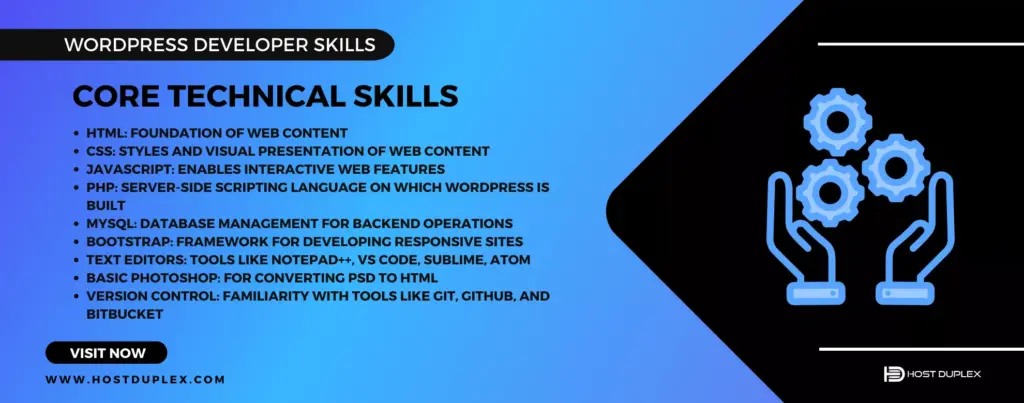
Every craftsman needs tools, and for a WordPress developer, these tools come in the form of core technical skills. These foundational skills form the backbone of any successful WordPress project. Let’s explore each of these essential skills:
HTML: Foundation of web content
HTML, or HyperText Markup Language, is the standard markup language used to create web pages. It’s the skeleton of a website, providing structure to the content. For web developers, a strong grasp of HTML is crucial as it allows them to create and modify the structure of WordPress websites.
CSS: Styles and visual presentation of web content
While HTML provides structure, CSS (Cascading Style Sheets) brings life to a web page through styling. It defines how HTML elements should appear on the screen. From colors and fonts to layouts and animations, mastering CSS ensures your WordPress sites are both functional and visually appealing.
JavaScript: Enables interactive web features
JavaScript adds interactivity to websites. Whether it’s a responsive menu, a dynamic form, or an animated slider, JavaScript makes it happen. And with the rise of libraries like React and frameworks like Angular, VUE.JS, and Next.JS, a WordPress developer’s arsenal is more powerful than ever.
PHP: Server-side scripting language on which WordPress is built
This programming language is the heart of WordPress. It’s a server-side scripting language that powers the core functionalities of WordPress. From themes and plugins to database interactions, a deep understanding of PHP is essential for any WordPress developer.
MySQL: Database management for backend operations
Every WordPress website relies on a database to store content, user data, and more. MySQL is the database management system that WordPress uses. Mastery of MySQL ensures smooth backend operations and efficient data retrieval.
Bootstrap: Framework for developing responsive sites
Responsiveness is key in an age where users access websites from many devices. Bootstrap is a popular framework that aids in developing sites that look and function seamlessly across devices.
Text Editors: Tools like Notepad++, VS Code, Sublime, Atom
A developer’s text editor is like a writer’s pen. It’s where the magic happens. Familiarity with popular text editors ensures efficient coding and debugging.
Basic Photoshop: For converting PSD to HTML
While not a coding skill, understanding basic Photoshop is invaluable. It aids in converting design files (PSD) into web formats, ensuring the final website aligns with the design vision.
Version Control: Familiarity with tools like Git, GitHub, and BitBucket
Version control is the safety net for developers. Tools like Git allow developers to track changes, collaborate seamlessly, and ensure that no piece of code is ever lost.
WordPress-Specific Skills
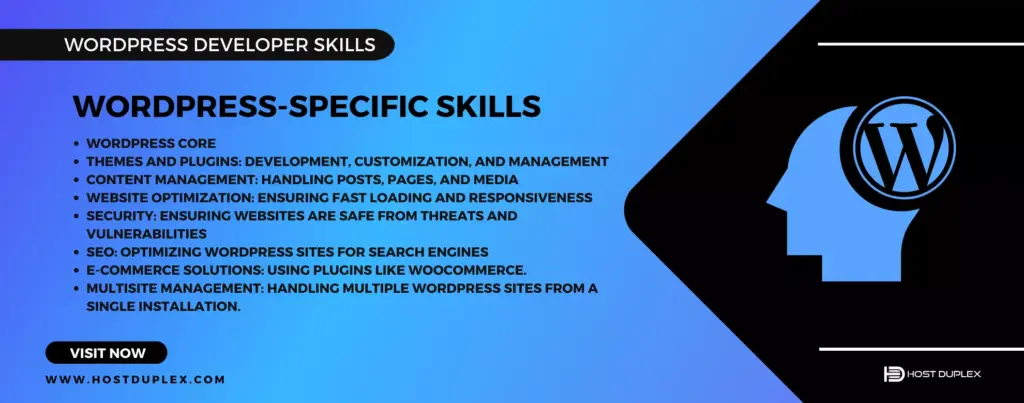
While core technical skills lay the foundation for web development, when it comes to WordPress, there’s a unique set of skills that developers need to master. These WordPress skills are tailored to the intricacies of the WordPress platform, ensuring that developers can create, customize, and optimize WordPress sites to their fullest potential.
WordPress Core
The heart of every WordPress site is its core. It’s the base software that powers the platform. Understanding the WordPress core means knowing how the platform functions, how it’s structured, and how to troubleshoot common issues. This knowledge ensures that developers can work seamlessly with WordPress, whether they’re building a site from scratch or customizing an existing one.
Themes and Plugins: Development, customization, and management
Themes dictate the look of a WordPress site, while plugins add functionality. Mastering theme and plugin development means being able to create custom designs and functionalities tailored to specific needs. It also involves understanding best practices for customization, ensuring that sites remain functional and secure even with multiple plugins.
Content Management: Handling posts, pages, and media
WordPress started as a blogging platform, and content remains its core. A skilled WordPress developer knows how to manage posts, pages, and media efficiently. This includes creating custom post types, organizing content, and ensuring that media files are optimized for the web.
Website Optimization: Ensuring fast loading and responsiveness
Users expect sites to load quickly and function smoothly. WordPress developers need to be adept at optimizing sites for speed, ensuring that pages load quickly and that sites are responsive across devices.
Security: Ensuring websites are safe from threats and vulnerabilities
With increasing cyber threats, security is paramount. A proficient web developer understands the common vulnerabilities of the platform and knows how to safeguard sites against them. This includes regular updates, security plugins, and best practices for safe development.
SEO: Optimizing WordPress sites for search engines
A beautiful, functional site is of little use if it doesn’t rank on search engines. SEO, or Search Engine Optimization, is the art of making sites search-engine friendly. From optimizing meta tags to ensuring clean URLs, WordPress developers need to be versed in best practices for SEO.
E-commerce Solutions: Using plugins like WooCommerce.
Online shopping is the norm today, and many WordPress sites are e-commerce platforms. Knowledge of e-commerce solutions, especially popular plugins like WooCommerce, is essential for developers building shopping sites.
Multisite Management: Handling multiple WordPress sites from a single installation.
For developers managing multiple sites—for a network of blogs, for instance—WordPress offers a multisite feature. Mastery of this feature allows developers to manage multiple sites efficiently from a single WordPress installation.
Advanced Technical Skills
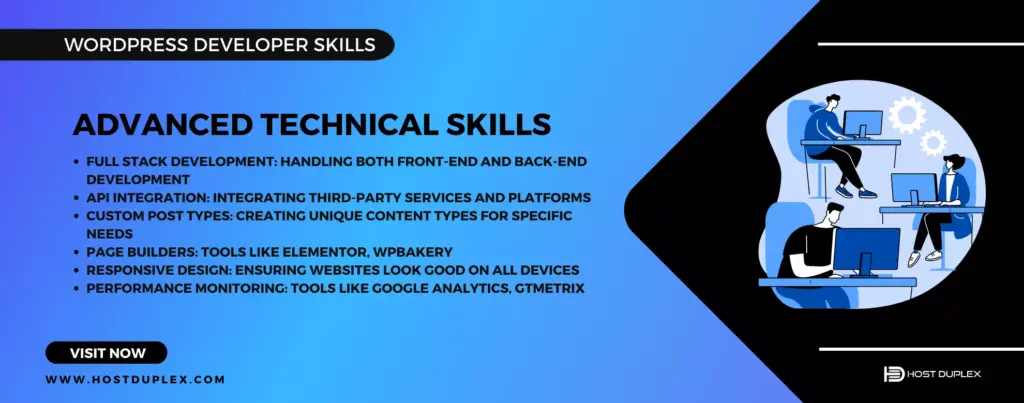
While the core and WordPress-specific skills form the foundation for any WordPress developer, the advanced technical skills are what set the experts apart from the novices. These skills allow developers to create more complex, integrated, and optimized WordPress sites. Let’s explore these advanced proficiencies:
Full Stack Development: Handling both front-end and back-end development
A full-stack developer is a jack of all trades. They handle both the front-end (what users see) and the back-end (server, database) of a website. For WordPress developers, this means being proficient in both PHP (for server-side scripting) and JavaScript (for client-side scripting). It’s about having a holistic view of the entire web development process.
API Integration: Integrating third-party services and platforms
APIs, or Application Programming Interfaces, allow different software applications to communicate with each other. For a WordPress developer, this means integrating third-party services like payment gateways, social media platforms, or CRM systems into a WordPress site. Mastery of API integration ensures seamless user experiences and enhanced site functionalities.
Custom Post Types: Creating unique content types for specific needs
WordPress comes with default post types like posts and pages, but sometimes there’s a need for more specific content types—like portfolios, testimonials, or products. Knowledge of creating and managing custom post types allows developers to tailor WordPress sites to specific business needs.
Page Builders: Tools like Elementor, WPBakery
Page builders have revolutionized the way we design WordPress sites. Tools like Elementor or WPBakery allow developers (and even non-developers) to design pages using a drag-and-drop interface. While they simplify the design process, expertise in these tools ensures that sites remain optimized and mobile-responsive.
Responsive Design: Ensuring websites look good on all devices.
With the myriad of devices available today, from smartphones to tablets to desktops, ensuring a website looks and functions well on all of them is crucial. Mastery of responsive design techniques ensures that WordPress sites offer consistent user experiences across devices.
Performance Monitoring: Tools like Google Analytics, GTmetrix
A well-functioning website is not just about design and features; it’s also about performance. Tools like Google Analytics provide insights into user behavior, while GTmetrix offers performance metrics. Proficiency in these tools allows developers to optimize sites based on real-world data.
Soft Skills and Business Acumen
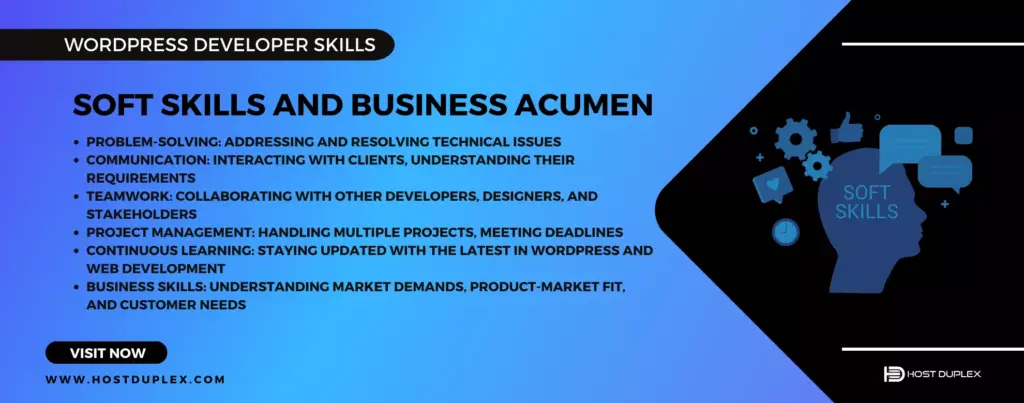
For a WordPress developer, soft skills and business acumen often determine the difference between a good developer and a great one. These skills ensure that developers create outstanding websites, understand the business context, and communicate effectively with clients and teams. Let’s explore these crucial competencies:
Problem-Solving: Addressing and resolving technical issues
Every project comes with its set of challenges. A developer’s ability to think critically, identify problems, and find effective solutions is invaluable. It’s about being proactive, anticipating potential issues, and addressing them before they escalate.
Communication: Interacting with clients, understanding their requirements
A project’s success often hinges on clear communication. Developers need to articulate their ideas, understand client requirements, and ensure that all stakeholders are on the same page. Effective communication prevents misunderstandings and ensures smooth project execution.
Teamwork: Collaborating with other developers, designers, and stakeholders
Web development is rarely a solo endeavor. It involves collaboration with designers, content creators, marketers, and other developers. A team-oriented mindset ensures that everyone contributes their best, leading to a successful project outcome.
Project Management: Handling multiple projects, meeting deadlines
Juggling multiple projects, prioritizing tasks, and meeting deadlines are all in a day’s work for a developer. Effective project management skills ensure that projects are delivered on time, within scope, and on budget.
Continuous Learning: Staying updated with the latest in WordPress and web development
The tech world is ever-evolving. New tools, techniques, and best practices emerge regularly. A commitment to continuous learning ensures that developers stay at the forefront of their field, bringing the latest innovations to their projects.
Business Skills: Understanding market demands, product-market fit, and customer needs
At the end of the day, a website is a business tool. Developers with a keen business acumen understand the market dynamics, recognize customer needs, and ensure that the websites they develop align with business objectives.
Specializations
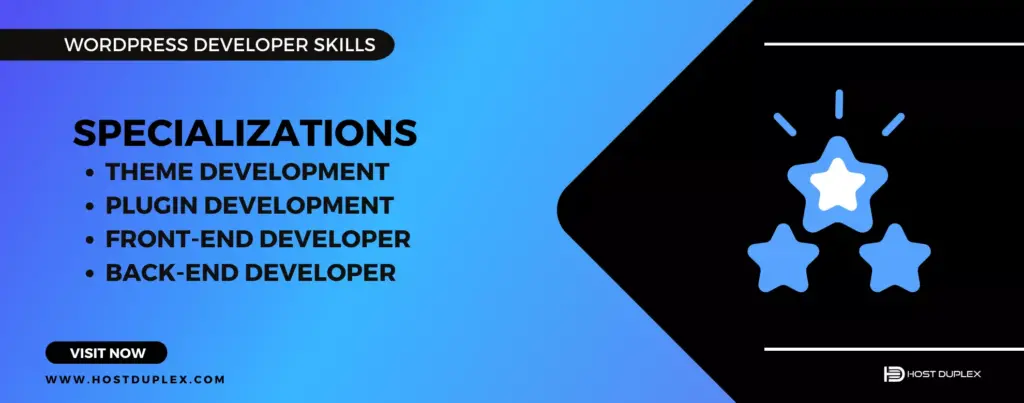
While a broad understanding of WordPress is essential, diving deep into specific areas can set a developer apart, making them invaluable to clients and businesses. Let’s explore these niche areas of expertise:
Theme Developer
Themes dictate the visual appeal of a WordPress site. They’re the first thing users notice and play a pivotal role in user experience.
A theme developer doesn’t just select colors and fonts. They understand a brand’s essence and translate it into a digital experience. They ensure that the site resonates with its target audience, is mobile-responsive, and aligns with the brand’s identity.
Plugin Developer
Plugins are the building blocks of a WordPress site’s functionality. From adding a simple contact form to integrating complex e-commerce solutions, plugins make it happen. A plugin developer recognizes the gaps in functionality and crafts solutions to bridge them. Their work ensures that a site isn’t just visually appealing but is also feature-rich, catering to the specific needs of the business.
Front-end Developer
The front end is where users interact. It’s about creating an intuitive, seamless, and engaging user experience. A front-end developer ensures that the site’s design is not just aesthetically pleasing but also user-friendly. They focus on optimizing load times, ensuring mobile responsiveness, and crafting an experience that delights users.
Back-end Developer
While users don’t see the back end, it’s what powers the site. It involves server-side operations, database management, and ensuring the smooth functioning of the WordPress core.
A back-end developer ensures that the site is robust, scalable, and secure. They handle the heavy lifting, ensuring that data is stored efficiently, the site remains hack-proof, and it can handle traffic surges with ease.
Additional Considerations
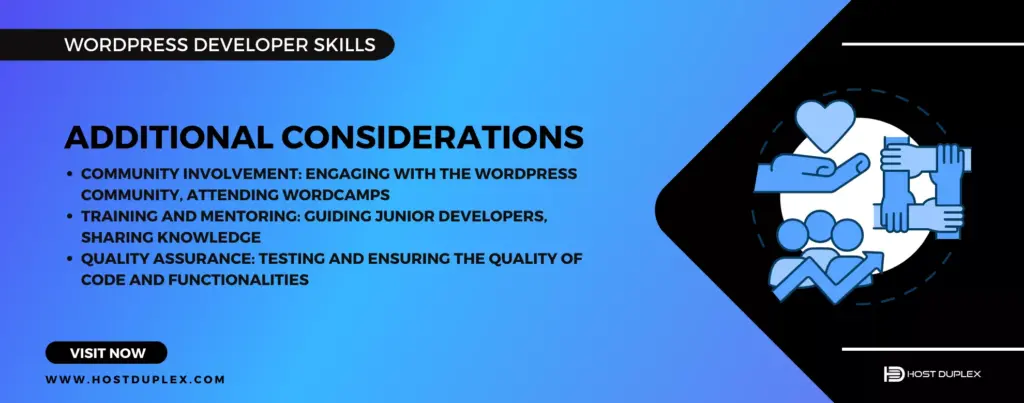
Beyond the technical skills and specializations, there are other facets to being a successful WordPress developer. These additional considerations can significantly impact a developer’s reputation, client relationships, and overall career trajectory. Let’s explore these often-overlooked yet crucial aspects:
Community Involvement: Engaging with the WordPress community, attending WordCamps
The WordPress community is vast, vibrant, and ever-evolving. Being an active participant in this community can offer numerous benefits.
Engaging with the community provides opportunities for networking, learning from peers, and staying updated with the latest trends and best practices. Attending WordCamps and other events can also lead to collaborations, partnerships, and even job opportunities.
Training and Mentoring: Guiding junior developers, sharing knowledge
As experienced developers, there’s an inherent responsibility to guide and mentor the next generation. Sharing knowledge and experiences helps junior developers and solidifies one’s understanding. It fosters a culture of continuous learning and collaboration within the community.
Quality Assurance: Testing and ensuring the quality of code and functionalities
Before any website or feature goes live, it’s imperative to ensure that it’s free from bugs and performs optimally. Quality assurance ensures that the end product aligns with the client’s expectations and provides a seamless user experience. Regular testing, code reviews, and performance checks can prevent potential issues and enhance the site’s overall quality.
Final Thoughts
WordPress development is dynamic, with new trends, tools, and techniques emerging regularly. As we move further into 2023, the importance of mastering the right WordPress Developer skills cannot be overstated. It’s not just about grasping the core technicalities of web development or programming languages but also about delving deeper to develop WordPress skills that truly make a difference. A developer’s journey is both challenging and rewarding.
Additionally, the soft skills, business acumen, and the ability to specialize set apart the good developers from the great ones. Engaging with the community, mentoring the next generation, and ensuring quality are facets that add depth to a developer’s profile.
Moreover, staying updated with the latest trends, participating in forums, attending WordCamps, and being an active member of the WordPress community can make all the difference.



WordPress Developer Skills You Should Master in 2023